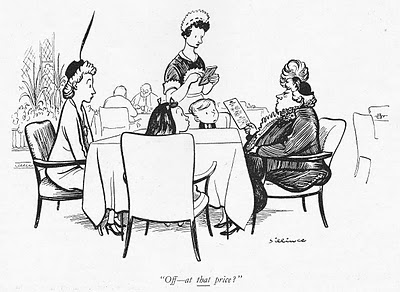Cartoon from Punch, March 5, 1952
Why would any one willingly invite perfect strangers into their home solely for the purpose of having them criticise the food that had been prepared for them? Why would you, except perhaps as a joke, attempt to transform your home into a restaurant?Stranger still why would anyone want to sit in front of television and watch other people doing either or both of the above?
Programmes like My Restaurant Rules and Come Dine With Me are hardly edifying and I think are in some ways down right offensive. (Brian Whitaker takes a different view, but then he doesn't even own a dining table!)
For one thing the whole notion of food as competition is wrong. The home cook doesn't need to have their food compared to that of other home cooks let alone professional chefs. When we invite people into our home to eat we don't expect them to analyse every mouthful or comment on the presentation. Eating meals at home with family and friends is about nurturing, hospitality, commensality, about nourishment. Having friends for dinner is about more than just the food we eat; it's about sharing, about quite literally breaking bread together.
These programmes offer no encouragement to non-cooks - rather the emphasis on style over substance is intimidating. As Michael Pollan has pointed out these programmes don't actually appeal to an audience who love to cook, rather they appeal to people who love to eat. What we learn from them is 'culinary fashion' not how to cook.
At worst it could be said that these shows denigrate the home cook, whoever it is in your household who produces the three meals every day. Good basic home cooking really isn't good enough. If you don't cook like a chef and present your guests with three course meals, each course utilising fashionable ingredients and glamorously 'plated', don't bother.
On the other hand if I were a professional chef I would be alarmed at the suggestion that anyone can cook like a chef - no formal training, no long apprenticeship required. Anyone can prepare food worthy of a restaurant - style wins out over substance again.
Eating out at a restaurant and eating at home are quite separate and unique experiences. Each has it's own set of rules and traditions. We expect some fundamental differences – where we eat is linked to who we dine with, what we eat, why we are dining together and when we eat. Sharing and hospitality have different meanings in these different contexts. In fact a restaurant is a business and successful restaurants, according to A.A. Gill are more about business than food.
My final gripe is that far too many television food programmes tend to extol extravagance and excess. The logical conclusion is that 'good' food revolves around fancy, schmancy, tricked about expensive ingredients rather than being food which is actually good for you.

No comments:
Post a Comment